Thousands of new jobs are coming to the Lansing area. Where will workers live?
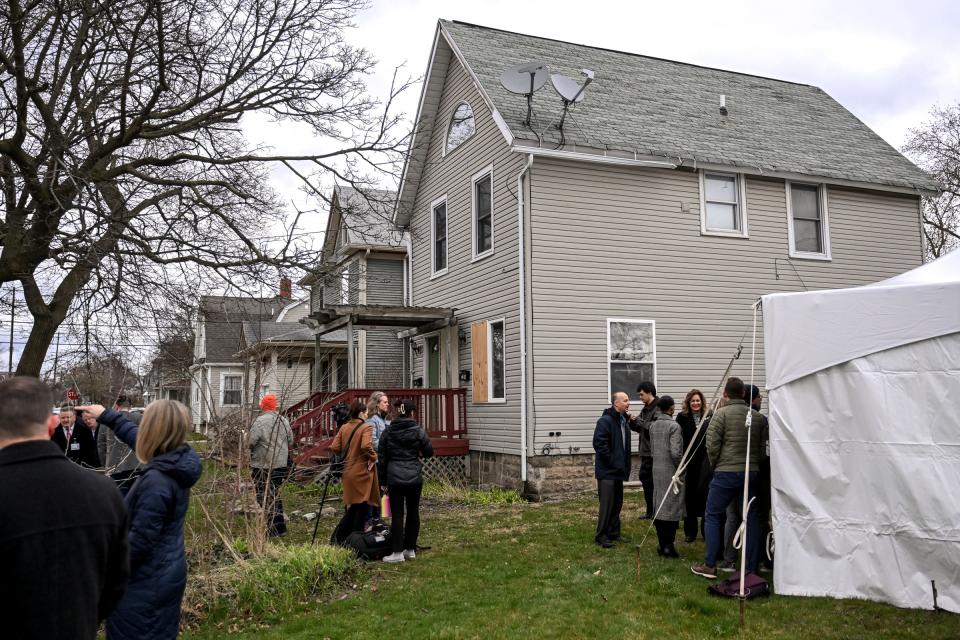
LANSING — Jan Munk was drawn to her eastside neighborhood more than four decades ago by its diversity and affordability.
The neighborhood, just a mile and a half from the heart of downtown, isn't as nice as it once was, she says, but she's hoping that a new initiative to rehab nine older homes bought for possible expansion by Sparrow Hospital but recently donated to nonprofits will help revitalize streets around her home.
Habitat for Humanity Capital Region and the Ingham County Land Bank will renovate the homes.
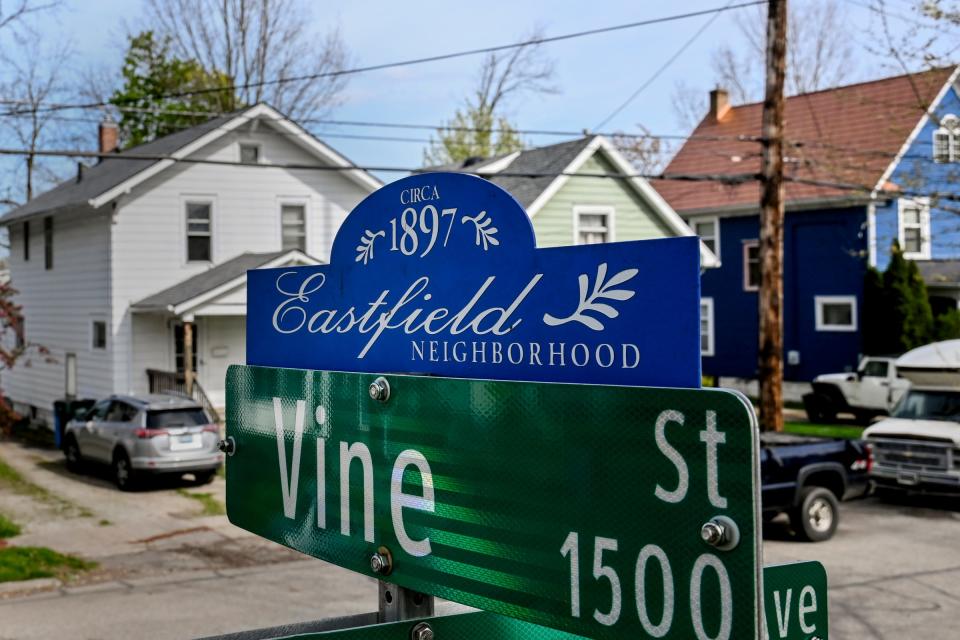
"Houses in our neighborhood are over $200,000, that's never happened here," Munk said. "I know I could sell our house. But what kind of place could you move to? My kids grew up here and I'd like to stay."
Michigan's population is stagnant, and that isn't likely to change unless the state's housing crisis is addressed, experts say. In the Lansing region alone, officials estimate 7,500 housing units need to be built soon just to keep up with the demand. The pace of rehabilitation of the region's older housing stock needs to quicken as well.
The lack of housing stock has sent home prices spiraling upward, at time when inflation has made rehabbing older homes expensive and, in some cases, nearly cost prohibitive.
It's a real-world problem officials are grappling with now. With several major employers set to open in the next year — including an Ultium battery plant and Amazon fulfillment center in Delta Township — the Lansing area is expecting to get more new jobs in a shorter time period than it has in years.
But where those new workers will live could be a big problem, said Ken Fletcher, Delta Township's supervisor.
There are just over 100 homes on the market with price points under $100,000, largely in Lansing, but experts caution many of those homes could need significant, expensive repairs. There's another 111 priced between $100,000 and $200,000, and more than 80 of those are in Ingham County, primarily in Lansing. For residents wanting to buy homes in Eaton and Clinton counties, or the more affluent areas of Ingham County, the vast majority of homes will be priced between $200,000 and $400,000 or more.
The Amazon and Ultium developments are expected to create more than 2,200 jobs by the end of 2025.
There aren't enough homes
Like the rest of Michigan, the low supply of quality housing is a big driver of increased housing costs, said Hillary Doe, Michigan's chief growth officer.
She cited Federal Reserve Bank data, from Chicago's branch, showing that Michigan needs to figure out housing before it can grow. That's going to take fixing up old homes, building new single family homes and standing up new apartment buildings, Doe said. The downtown Lansing area added at least 600 housing units in the last two and a half years with hundreds more that are under construction.
There simply aren't enough housing units, and that lack of options causes housing costs to rise, said Amy Hovey, CEO and executive director of the Michigan State Housing Development Authority, which offers programs for renters, owners and developers.
“The big issue we have in our state is supply, we don’t have enough housing to meet our needs and we can’t just build our way out of it without some incentives or subsidies," she said.
State housing leaders announced earlier this month a new statewide grant program with $60 million to fix dilapidated homes or build new ones.
Doe came to Lansing a few days later, for a separate housing announcement for new apartments units at the REO Gateway Apartments, at Washington Avenue and Malcolm X Street, beside Interstate 496.
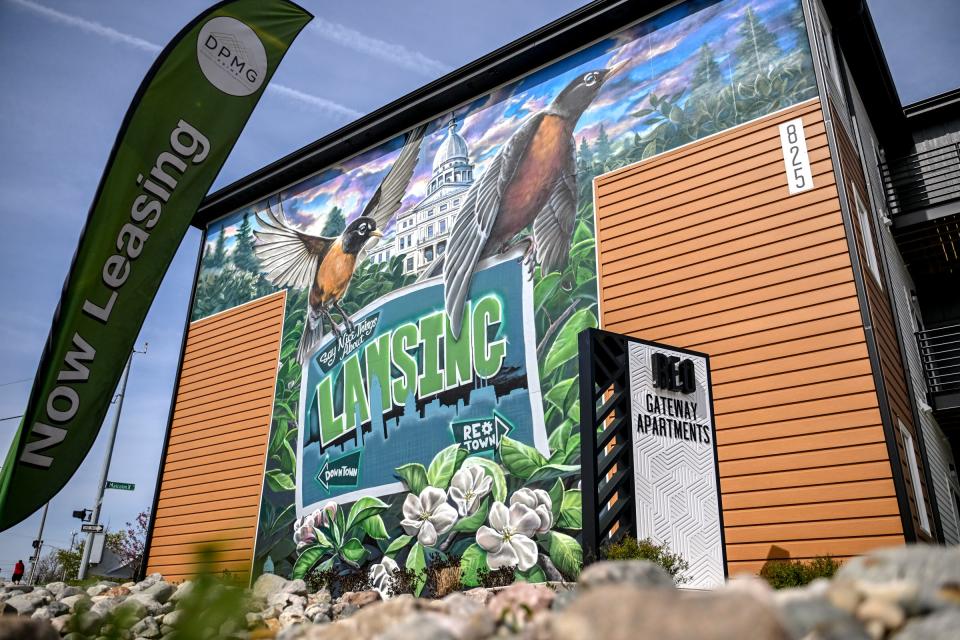
A fourth building at REO Gateway, that will rely on state funding, was announced. It will have two dozen new units, in addition to the complex's 72 existing units, which started opening for lease last year.
The apartments took about a decade to build from the concept, said developer Brett Forsberg.
That timeline needs to be dramatically compressed, he said, if Michigan wants to build more housing.
How many houses do we need?

State data puts the number of new homes that need to be built at around 7,500 in Greater Lansing.
Alan Fox, Ingham County's treasurer and a board member of the Ingham County Land Bank, said the number may be closer to 10,000, but coming anywhere close to either number would take many years and plenty of effort.
Fletcher said Delta Township has gotten serious, and creative, about opening up housing options in preparation for the township's new employers.
The township has recently changed its ordinances to allow for more variety of homes — like smaller cottage homes and more permissive multi-family projects — and is working to expand sewer access to open development in the western parts, Fletcher said.
The township recently approved an expansion that would nearly double one of the area's larger apartment complexes, adding another 354 units in 11 new buildings.
Developers have been more interested in apartments and multi-family units than neighborhoods of single-family homes, potentially because of the current interest and construction costs, he said.
Some of that may be changing soon.
Even as costs remain high, the number of new home permits in February was 38% higher than February 2023. That may be, in part, a one-time statistical blip because of potential new state regulations and a mild winter, said Bob Filka, CEO of the Home Builders Association of Michigan.
"There are too few housing options available and we've had a mild winter," Filka said. "This, along with the potential of significant new housing costs being imposed by LARA (Michigan Department of Licensing and Regulatory Affairs) later this year, with new costly proposed code requirements, explains the acceleration we're seeing."
He said builders worry that sprinklers and other potential code requirements could increase costs for a single home by $20,000 or more.
Filka said regulatory and construction costs already make it "usually impossible to build a home for less than $350,000 or $400,000 and make money in the mid-Michigan market."
Not even $15 billion would fix it
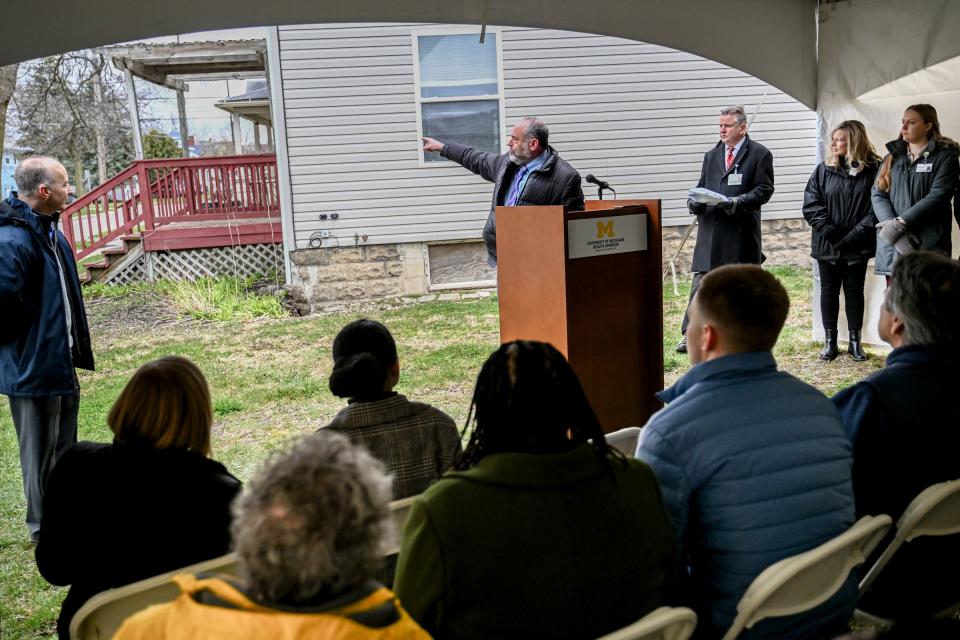
Fox said the housing shortage is a $15 billion problem, assuming 7,500 homes could be built for a likely unrealistic $200,000 each. But it would still be difficult, if not impossible, to find the people, the material and the land to do it in a reasonable time period.
The county doesn't have billions. It does have $9 million remaining in pandemic money dedicated toward housing and county commissioners are starting to float a proposal to add a county millage to support housing.
The existing money won't go far if the county builds homes; it'd be a few dozen houses.
So instead, Fox and county officials are planning to use it to fund educational programs, attract private investment and otherwise try to stretch the money.
Encouraging homeowners to keep up with repairs, connecting investors with local real estate options and helping renters to save up money are some of the ways the area's housing situation will get better, he said.
And nonprofits will play a role.
It will take several years for the homes Sparrow Health System once bought for possible expansion of health facilities to be rehabbed, said Brent Taylor, executive director of Habitat for Humanity Capital Region, adding that his organization is about six months into that process. They are working on about half of the homes.
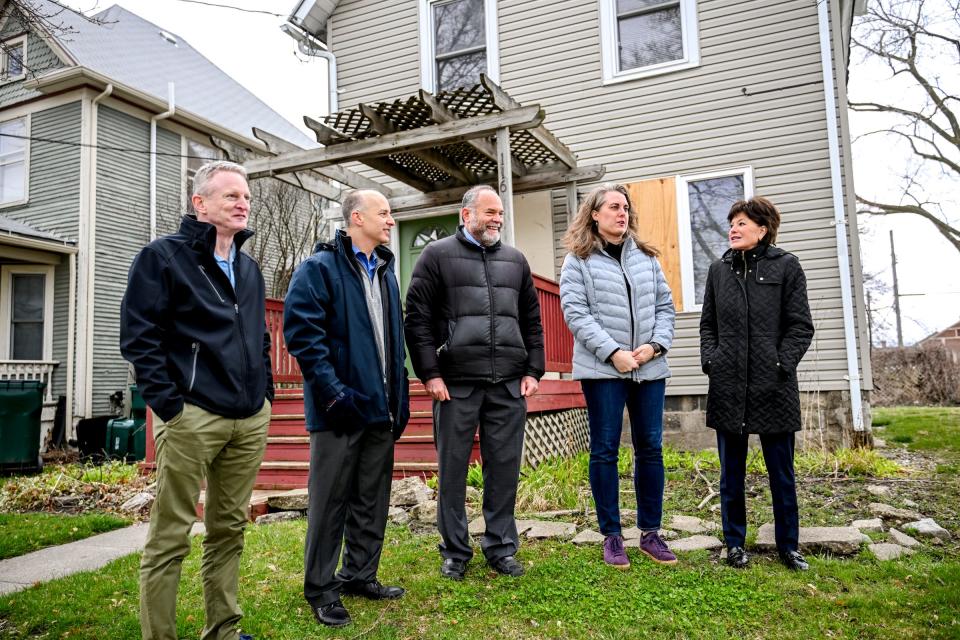
For the Sparrow homes, Taylor said it was important to renovate those as single-family homes. Having a broad mix of housing — rentals, single-family homes and others — is important, although one of the gaps in the market now is single-family homes, he said. Many of the homes Sparrow donated were split over the years into duplexes and will be converted back into large single-family homes.
The homes tick all the boxes for Josh Hamilton, who lives in the neighborhood and works for University of Michigan Health-Sparrow. As he waited for the school bus to drop off kids Monday, Hamilton said he wanted the vacant homes to be fixed up and owner-occupied so he'll have some new neighbors soon.
"I'm excited to see it happen," Hamilton said.
'We can't just build our way out of it'
The state has been in a housing crisis for years, Hovey said.
"We can't just build our way out of it without some incentives or subsidies because of what it costs for people to build," Hovey said. "Because what it costs to build, the average Michigander can't afford to pay."
The incentives and subsidies would come from a variety of state and federal programs, along with municipal and county-level programs. There are so many options that working with a local housing agency can help people find programs, Hovey said.
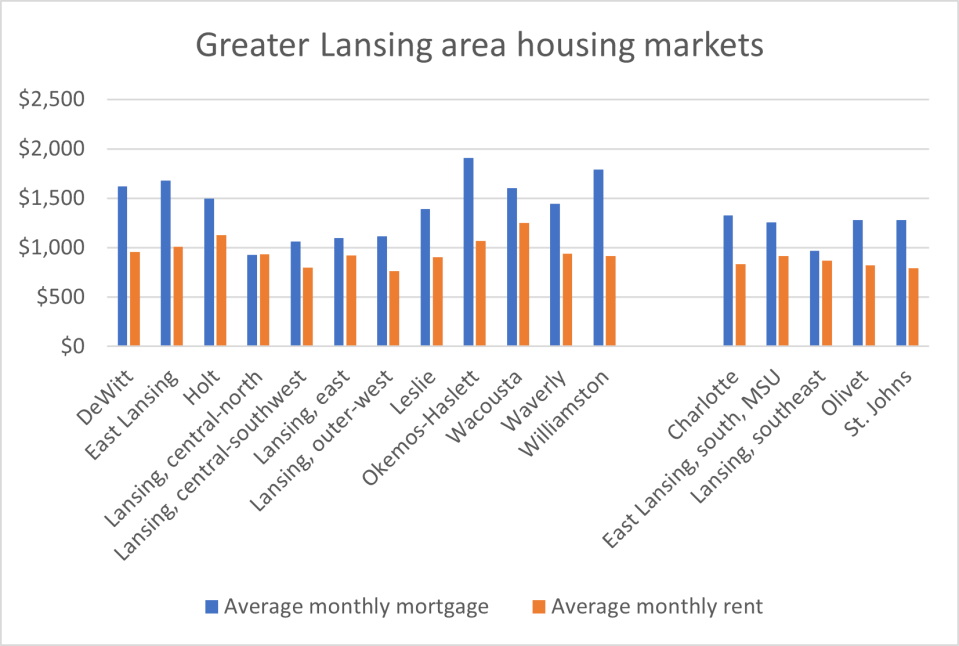
She said the state's efforts at attracting jobs are running into problems because potential recruits can't always find housing. That means companies sometimes pull out of Michigan plans or don't consider the state due to a lack of housing.
"You cannot imagine how frustrating it is for an employee to have to pull out of a job, and say they can't find housing so they can't take that job," Hovey said. "That happens across our state, including in Lansing."
Rawley Van Fossen, Lansing's director of economic development and planning, said the Capital Area Housing Partnership, Habitat for Humanity Capital Region, the Ingham County Land Bank and Eastside Community Action Center are four of the groups doing the work on the former Sparrow homes. Together they can probably do dozens a year, welcome relief for some but it doesn't go far enough.
Fixing up those homes — and others like them in Lansing, which has many homes 75 years old or older — will often cost more than they will be valued at afterward, said Van Fossen, who until recently was the executive director of the Capital Area Housing Partnership.
Van Fossen said it can cost a homeowner or a property developer a few hundred thousand dollars to buy a Lansing property, get the professional planning work necessary for the renovation, get permits, hire a contractor and pay for the renovation. At the end, the home may appraise for $170,000, on a good day, he said.
"There's a gap," he said, acknowledging a major factor that can keep people from improving homes in Lansing. "A private developer or someone who is not mission based, they’re not going to do that. We can’t rely on our nonprofits."
Most people will need more financial support.
He said some of the city's best tools are education and connections to a wide variety of financial supports: Teaching real estate and financial literacy at community centers and being able to walk people through the permitting and construction process. The state offers several programs to help fund repairs, renovations, new homeowners, early-stage developers and large-scale developments.
Utility companies can also offer incentives for appliances and modernizations, Van Fossen said.
Anyone who wants to do significant renovations for themselves, or even get into developing houses or flipping them, can go to Lansing's offices and get some help with the wide variety of programs, Van Fossen said.
To get more affordable housing, Filka suggests density like smaller lots and multi-family options like townhomes or duplexes, as well as taking advantage of state subsidies like tax credits and construction subsidies.
Contact Mike Ellis at mellis@lsj.com or 517-267-0415
This article originally appeared on Lansing State Journal: Lansing area housing shortage a $15 billion problem
